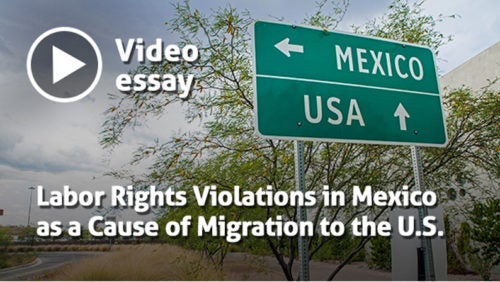Deadline for submissions:
November 30, 2018
Winners announced:
December 28, 2018
Student Writing Competition 2018
Imaginative Responses to the Globalization Backlash
Organized by:
In much of the developed world, a backlash against globalization has gained momentum. The United Kingdom has decided to leave the European Union and the United States has pulled out of the Trans-Pacific Partnership Agreement. Meanwhile, a renegotiation (or withdrawal?) of NAFTA is brewing. The moment is ripe to rethink the course that globalization has taken and to offer alternative paths.
Currently, however, the two dominant positions in the global economic debate consist largely of a wholesale rejection of globalization or, conversely, a defense of the existing liberal globalization as the enlightened economic path that needs to be softened and better explained. This binary choice is too narrow. Can a different type of globalization be imagined? One that recognizes the gains that societies may accrue from economic integration but that at the same time deals seriously with dislocation and negative distributional consequences? Does this require a reform of our existing global institutional arrangements? More concretely, are there specific rules or policies that can be revisited or introduced to respond to these challenges?
We are pleased to announce our 2018 winning student submissions
Our first student writing competition is over. With 60 submissions from more than 13 countries and at least one entry from every continent, participation in the competition was truly global and wide-ranging!
Winning essays were awarded the Marcos and Ida Kerschner Prize: $2,500 for first place, $1,500 for second place, and $1,000 for third place. The top essay has also been published by our competition partner Americas Quarterly, the leading publication on politics, business, and culture in the Americas. A panel of three experts considered submissions and chose winners under blind review.
____________________
 In the U.S., like in many other developed countries, a nationalist, anti-immigrant response to economic troubles is on the rise. Rather than discerning and addressing the root causes of migration, approaches to migration have focused on criminalizing individuals who cross borders in pursuit of work. An imaginative response to migration calls for a systemic approach focused on human and labor rights enforcement in the source countries, which could help improve living standards and help make migration a choice, not a necessity.
In the U.S., like in many other developed countries, a nationalist, anti-immigrant response to economic troubles is on the rise. Rather than discerning and addressing the root causes of migration, approaches to migration have focused on criminalizing individuals who cross borders in pursuit of work. An imaginative response to migration calls for a systemic approach focused on human and labor rights enforcement in the source countries, which could help improve living standards and help make migration a choice, not a necessity.
 The flows of investment between states and nationals of other states make up a major component of globalization. Lately, the international rules devised to protect and promote these investment flows have come under fire, and concerns have been raised that there has been a failure to strike a fair balance between competing public and private interests. An imaginative solution is to look beyond the mere modernization of the investor-state dispute settlement rules and consider a reformulation of the system, including the creation of a World Investment Organization and the inclusion of sustainable development objectives in investment treaties.
The flows of investment between states and nationals of other states make up a major component of globalization. Lately, the international rules devised to protect and promote these investment flows have come under fire, and concerns have been raised that there has been a failure to strike a fair balance between competing public and private interests. An imaginative solution is to look beyond the mere modernization of the investor-state dispute settlement rules and consider a reformulation of the system, including the creation of a World Investment Organization and the inclusion of sustainable development objectives in investment treaties.
 The growing divide of income inequality and the impoverishment of the working class are strong evidence cited in opposition to globalization. The current international labor governance framework fails to address the political economy in global value chains and neglects to provide regulators with enough incentives to enforce robust labor standards. An imaginative solution is to incentivize states, especially those with large internal markets and significant consumer power, to enhance their domestic regulations and encourage other states to do the same. Governments that take a central role in influencing other state and corporate actors to avoid the regulatory race to the bottom can help establish better labor conditions in global value chains for all.
The growing divide of income inequality and the impoverishment of the working class are strong evidence cited in opposition to globalization. The current international labor governance framework fails to address the political economy in global value chains and neglects to provide regulators with enough incentives to enforce robust labor standards. An imaginative solution is to incentivize states, especially those with large internal markets and significant consumer power, to enhance their domestic regulations and encourage other states to do the same. Governments that take a central role in influencing other state and corporate actors to avoid the regulatory race to the bottom can help establish better labor conditions in global value chains for all.

